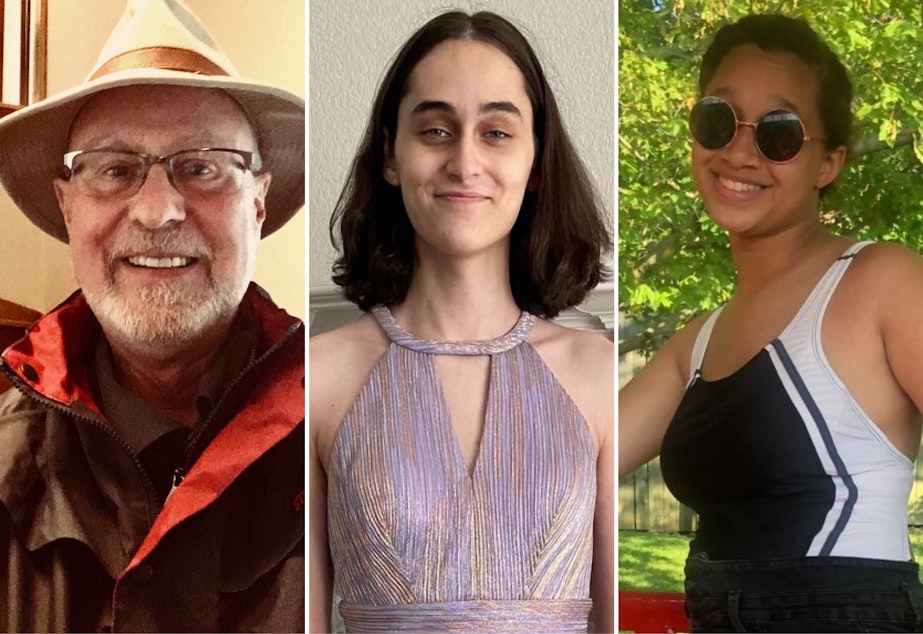Pride and joy, more than 50 years in the making

It’s Pride Month, and thousands of people of all ages are participating in LGBTQ Pride events across the region. RadioActive Youth Media’s Lyn Strober-Cohen looked into how the queer experience has changed — and stayed the same — over the decades.
[RadioActive Youth Media is KUOW's radio journalism and audio storytelling program for young people. This story was entirely youth-produced, from the writing to the audio editing.]
A
s an 18-year-old queer teen, I wanted to know what growing up queer in the U.S. was like before the internet, and marriage equality, and TV shows like "RuPaul's Drag Race" and "Pose."
So I talked to Bill Thieleman.
Sponsored
Bill is 75 years old and a longtime Seattle resident. He describes himself as a man who is responsible, caring, and openly gay. He said that, when he was younger, being openly gay wasn't always a choice.
Bill grew up in a white, well-educated, middle-class family in the suburbs outside of New York City. I asked him to tell me about his experiences growing up as a queer person. He started with a story from the summer of 1969.
“The Vietnam War was going at it," Bill said.
Bill was 22 years old, and he had just graduated from college. He was called to Fort Hamilton in New York for a draft physical. When he arrived, he was given some paperwork to fill out.
“One of the questions was a checklist," Bill said. "And it asked if I had ever had measles, mumps, chickenpox, homosexual tendencies, tuberculosis, polio. And I'm kind of like, ‘Oh, okay. Yes, yes, no, no. Uhhhhhhh.’ The burning question.”
Sponsored
At first, this story caught me off guard. But then I remembered that gay and lesbian people couldn’t serve openly in the military until 2011, when "Don’t Ask, Don’t Tell" was repealed.
As we talked, Bill told me stories about being targeted by the police for being gay, and living through the AIDS crisis (both things that disproportionately affect people not like him: like Black and Latinx queer people, trans women of color, and poor or low-income queer people).
But throughout Bill’s stories, there was one constant: the joy he finds in the queer community.
For example, back in the 1970s, he said, "The gay community was just blooming. Stonewall had already happened, so there were marches in Manhattan, you know, the Pride marches. And Bette Midler came to Washington Square and sang, ‘You've got to have friends.’ Just wonderful."
Sponsored
Hearing Bill’s stories about his experiences — good and bad — made me think about the current experiences of young queer people in our country.
There’s a new law in Florida that restricts teaching about gender and sexual orientation and a new law in Alabama that makes it a felony to provide gender-affirming medical treatment to transgender youth.
I asked two of my friends, Eridon Stewart and Madi Goldstein, about their experiences as queer teens.
Eridon is 17 years old and lives in Seattle, Washington.
"I have known that I was bisexual since I was 6 years old," Eridon said. "And luckily for me I grew up in a really accepting home where I was immediately embraced and accepted."
Sponsored
Madi is 18 years old and lives in Dallas, Texas.
"My experience being queer has been a difficult one," Madi said. "I didn't realize I was queer until maybe a year and a half ago."
Both Madi and Eridon said that lawmakers' efforts to restrict rights for LGBTQ youth are upsetting, and make it hard for queer youth to feel safe and comfortable.
"In many states there are people working extremely hard to make sure kids like me don't get to be their true selves," Eridon said. "It makes me really sad."
Madi agreed. "For example, the Don’t Say Gay bill implies that someone will be gay if they hear about the word, which is just not true," Madi said.
Sponsored
But, Eridon said, she loves being queer.
"I love my queer community who is always joyful, and creating all types of wonderful art and community events," Eridon said. "There is nothing wrong with being queer. In fact, it’s a gift."
I agree— being queer is a gift.
My queerness has given me a deeper appreciation for my supportive parents, teachers and friends. It’s helped me love my body. And it’s allowed me to let go of societal expectations of the way things "should" be.
While being out as queer is sometimes painful, the joy and community that come with it is worth it.
---
This story was created in KUOW's RadioActive Advanced Producer Workshop for high school and college students, with production support from Kelsey Kupferer. Edited by Katie Campbell.
Special thanks to Bill Freeberg and Riz Rollins who were also interviewed for this story, although they are not quoted in the final piece. Their interviews provided context and insight that helped shape this story.
Find RadioActive on Facebook, Twitter, TikTok and Instagram, and on the RadioActive podcast.
Support for KUOW's RadioActive comes from the Bill & Melinda Gates Foundation Discovery Center.
If you have any feedback on this story, you can email us at radioactive@kuow.org, or click the teal feedback tab on the edge of this page. Reach out. We're listening.



